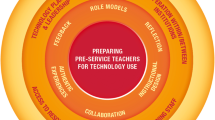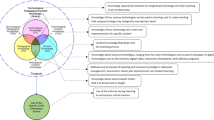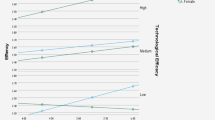Abstract
This study explored pre-service teachers’ technological pedagogical content knowledge levels and their blended teaching readiness. In this context, the study employed the cross-sectional survey design, and the variables were analyzed descriptively and correlationally. The study was carried out with the participation of 477 pre-service teachers. Data were collected using the Blended Teaching Readiness Instrument and the Technological Pedagogical Content Knowledge-Deep (TPACK deep) Scale. The analyses put forth that pre-service teachers technological pedagogical content knowledge levels were high in the dimensions of design, exertion, and proficiency, whereas their levels were moderate in the dimension of ethics. In addition, pre-service teachers’ blended teaching readiness levels were found to be high in the dimensions of dispositions, online integration, data practices, personalizing instruction, and online interaction. Furthermore, a significant and positive high-level correlation was revealed between pre-service teachers’ technological pedagogical content knowledge levels and their blended teaching readiness. Also, pre-service teachers’ technological pedagogical content knowledge levels could explain 66% of the variance in their blended teaching readiness.

Similar content being viewed by others
Explore related subjects
Discover the latest articles, news and stories from top researchers in related subjects.Data Availability
The datasets analyzed during the current study are available from the corresponding author on reasonable request.
Data Availability
The data used is available on request.
References
Adams, D., Tan, M. H. J., & Sumintono, B. (2021). Students’ readiness for blended learning in a leading malaysian private higher education institution. Interactive Technology and Smart Education, 18(4), 515–534. https://doi.org/10.1108/ITSE-03-2020-0032.
Aktaş, İ., & Özmen, H. (2020). Investigating the impact of TPACK development course on pre-service science teachers’ performances. Asia Pacific Education Review, 21(4), 667–682. https://doi.org/10.1007/s12564-020-09653-x.
Al-Abdullatif, A. M. (2019). Auditing the TPACK confidence of pre-service teachers: The case of Saudi Arabia. Education and Information Technologies, 24(6), 3393–3413. https://doi.org/10.1007/s10639-019-09924-0.
Albeta, S. W., Firdaus, L. N., & Copriady, J. (2023). TPACK-based blended learning as an implementation of progressivism education: A systematic literature review. Jurnal Pendidikan Vokasi, 13(1), 44–59. https://doi.org/10.21831/jpv.v13i1.51287.
Archibald, D. E., Graham, C. R., & Larsen, R. (2021). Validating a blended teaching readiness instrument for primary/secondary preservice teachers. British Journal of Educational Technology, 52(2), 536–551. https://doi.org/10.1111/bjet.13060.
Arnesen, K. T., Graham, C. R., Short, C. R., & Archibald, D. (2019). Experiences with personalized learning in a blended teaching course for preservice teachers. Journal of online learning research, 5(3), 275–310.
Ates Cobanoglu, A., & Cobanoglu, I. (2021). Do turkish student teachers feel Ready for Online Learning in Post-Covid Times? A study of Online Learning readiness. Turkish Online Journal of Distance Education, 22(3), 270–280. https://doi.org/10.17718/tojde.961847.
Büyüköztürk, Ş., Kılıç-Çakmak, E., Akgün, Ö. E., Karadeniz, Ş., & Demirel, F. (2015). Bilimsel Araştırma Yöntemleri. Pegem Yayınevi.
Calderón, A., Scanlon, D., MacPhail, A., & Moody, B. (2021). An integrated blended learning approach for physical education teacher education programmes: Teacher educators’ and pre-service teachers’ experiences. Physical Education and Sport Pedagogy, 26(6), 562–577. https://doi.org/10.1080/17408989.2020.1823961.
Cunningham, D. (2021). A case study of teachers’ experiences of blended teaching and learning. Journal of Online Learning Research, 7(1), 57–83.
Demirtaş, B., & Mumcu, F. (2021). Pre-service Teachers’ perceptions of ICT and TPACK competencies. Acta Educationis Generalis, 11(2), 60–82. https://doi.org/10.2478/atd-2021-0013.
George, D., & Mallery, P. (2016). IBM SPSS statistics 23 step by step: A simple guide and reference. Routledge.
Gürbüz, S. (2019). Amos ile yapısal eşitlik modellemesi: Temel ilkeler ve uygulamalı analizler. Seçkin Publishing.
Hair, J. F., Hult, G. T. M., Ringle, C. M., & Sarstedt, M. (2017). A primer on partial least squares structural equation modeling (PLS-SEM). Sage publications.
Hamzah, F., Phong, S. Y., Sharifudin, M. A. S., Zain, Z. M., & Rahim, M. (2021). Exploring students’ readiness on English language blended learning. Asian Journal of University Education, 16(4), 161–170.
Hauk, S., John, S., K., & Jones, M. (2021). Profiles of readiness: Using a blended framework to explore what it takes for faculty to be ready to change instructional practice. Journal of Geoscience Education, 69(3), 281–299. https://doi.org/10.1080/10899995.2021.1878573.
Jenkins, L. E., & Crawford, R. (2021). Pre-service music teachers’ understanding of blended learning: Implications for teaching post COVID-19. Australian Journal of Teacher Education (Online), 46(7), 86–96.
Junus, K., Santoso, H. B., Putra, P. O. H., Gandhi, A., & Siswantining, T. (2021). Lecturer readiness for online classes during the pandemic: A survey research. Education sciences, 11(3), 139. https://doi.org/10.3390/educsci11030139.
Kabakci Yurdakul, I. (2018). Modeling the relationship between pre-service teachers’ TPACK and digital nativity. Educational Technology Research and Development, 66(2), 267–281. https://doi.org/10.1007/s11423-017-9546-x.
Kara, S. (2021). An investigation of Technological Pedagogical and Content Knowledge (TPACK) competencies of pre-service visual arts teachers. International Journal of Technology in Education (IJTE), 4(3), 527–541. https://doi.org/10.46328/ijte.184.
Karatas, K., & Arpaci, I. (2021). The role of self-directed learning, metacognition, and 21st century skills predicting the readiness for online learning. Contemporary Educational Technology, 13(3), https://doi.org/10.30935/cedtech/10786.
Kartal, T., & Afacan, O. (2017). Examining Turkish pre-service science teachers’ technological pedagogical content knowledge (TPACK) based on demographic variables. Journal of Turkish Science Education, 14(1), https://doi.org/10.12973/tused.10187a.
Kılıç, A., Aydemir, S., & Kazanç, S. (2019). Teknolojik Pedagojik Alan Bilgisi (TPAB) Temelli Harmanlanmış Öğrenme Ortamının Fen Bilimleri Öğretmen Adaylarının TPAB ve Sınıf İçi Uygulama Becerilerine Etkisi. Ilkogretim Online, 18(3), https://doi.org/10.17051/ilkonline.2019.611493.
Kurniasih, S., Hardiansyah, M. A., Ikhsanuddin, I., & Nulhakim, L. (2022). Measuring tpack skills of elementary school teachers: Readiness to teach science in blended-learning era. JPsd (Jurnal Pendidikan Sekolah Dasar), 8(1), 12–24. https://doi.org/10.30870/jpsd.v8i1.14107.
Lleras, C. (2005). Path analysis. Encyclopedia of social measurement, 3(1), 25–30.
Martín-Martínez, L., Sainz, V., & Rodríguez-Legendre, F. (2020). Evaluation of a blended learning model for pre-service teachers. Knowledge Management & E-Learning: An International Journal, 12(2), 147–164. https://doi.org/10.34105/j.kmel.2020.12.008.
Mestan, K. (2019). Create a fine blend: An examination of institutional transition to blended learning. Australasian Journal of Educational Technology, 35(1), https://doi.org/10.14742/ajet.3216.
Mishra, P., & Koehler, M. J. (2006). Technological pedagogical content knowledge: A framework for teacher knowledge. Teachers college record, 108(6), 1017–1054. https://doi.org/10.1111/j.1467-9620.2006.0068.
Mıhcı Türker, P., & Öztürk, M. (2022). Harmanlanmiş öğretime hazırbulunuşluk ölçeğinin Türkçe uyarlama çalışması. Eğitim. Teknolojisi Kuram ve Uygulama, 12(2), 460–479. https://doi.org/10.17943/etku.1084982.
Mujallid, A. (2021). Instructors’ readiness to teach online: A review of TPACK Standards in Online Professional Development Programmes in Higher Education. International Journal of Learning Teaching and Educational Research, 20(7), 135–150. https://doi.org/10.26803/ijlter.20.7.8.
Mulyadi, D., Wijayatingsih, T., Budiastuti, R., Ifadah, M., & Aimah, S. (2020). Technological pedagogical and content knowledge of ESP teachers in blended learning format. International Journal of Emerging Technologies in Learning (iJET), 15(6), 124–139.
Naaz, S., & Khan, Z. (2018). Measuring the Technological Pedagogical Content Knowledge (TPACK) of pre-service teachers in relation to their gender and Streams. Online Submission, 22(1), 50–55.
Neumann, K. L., Alvarado-Albertorio, F., & Ramírez-Salgado, A. (2021). Aligning with practice: Examining the Effects of a practice-based Educational Technology Course on Preservice Teachers’ potential to teach with technology. TechTrends, 65(6), 1027–1041. https://doi.org/10.1007/s11528-021-00672-y.
Nguyen, G. N., Bower, M., & Stevenson, M. (2022). The discourse of design: Patterns of TPACK Contribution during pre-service teacher learning design conversations. Education and Information Technologies, 1–30. https://doi.org/10.1007/s10639-022-10932-w.
Oliver, M., & Trigwell, K. (2005). Can ‘blended learning’ be redeemed? E-learning and Digital Media, 2(1), 17–26.
Papanikolaou, K., Makri, K., & Roussos, P. (2017). Learning design as a vehicle for developing TPACK in blended teacher training on technology enhanced learning. International Journal of Educational Technology in Higher Education, 14(1), 1–14. https://doi.org/10.1186/s41239-017-0072-z.
Pardede, P. (2019). Pre-service EFL Teachers’ perception of blended learning. Journal of English Teaching, 5(1), 1–14.
Pulham, E., & Graham, C. R. (2018). Comparing K-12 online and blended teaching competencies: A literature review. Distance Education, 39(3), 411–432. https://doi.org/10.1080/01587919.2018.1476840.
Qasem, A. A. A., & Viswanathappa, G. (2016). Blended learning approach to develop the teachers’ TPACK. Contemporary Educational Technology, 7(3), 264–276.
Redmond, P., & Lock, J. (2019). Secondary pre-service teachers’ perceptions of technological pedagogical content knowledge (TPACK): What do they really think? Australasian Journal of Educational Technology, 35(3), https://doi.org/10.14742/ajet.4214.
Redmond, P., & Peled, Y. (2019). Exploring TPACK among pre-service teachers in Australia and Israel. British Journal of Educational Technology, 50(4), 2040–2054.
Saboowala, R., & Manghirmalani Mishra, P. (2021). Readiness of in-service teachers toward a blended learning approach as a learning pedagogy in the post-COVID-19 era. Journal of Educational Technology Systems, 50(1), 9–23. https://doi.org/10.1177/00472395211015232.
Santos, J. M., & Castro, R. D. (2021). Technological Pedagogical content knowledge (TPACK) in action: Application of learning in the classroom by pre-service teachers (PST). Social Sciences & Humanities Open, 3(1), https://doi.org/10.1016/j.ssaho.2021.100110.
Schmid, M., Brianza, E., & Petko, D. (2021). Self-reported technological pedagogical content knowledge (TPACK) of pre-service teachers in relation to digital technology use in lesson plans. Computers in Human Behavior, 115, 106586. https://doi.org/10.1016/j.chb.2020.106586.
Şentürk, C. (2021). Effects of the blended learning model on preservice teachers’ academic achievements and twenty-first century skills. Education and Information Technologies, 26(1), 35–48. https://doi.org/10.1007/s10639-020-10340-y.
Short, C. R., Graham, C. R., Holmes, T., Oviatt, L., & Bateman, H. (2021). Preparing Teachers to teach in K-12 blended environments: A systematic mapping review of Research Trends, Impact, and themes. TechTrends, 65(6), 993–1009. https://doi.org/10.1007/s11528-021-00626-4.
Sintawati, M., & Abdurrahman, G. (2020). The effectiveness of blended learning to improve pre-service teacher TPaCK in developing multimedia learning mathematics at elementary school. Journal of Physics: Conference Series, 1521(3), https://doi.org/10.1088/1742-6596/1521/3/032014.
Sugiharto, B., Corebima, A. D., & Susilo, H. (2019). The pre-service biology teacher readiness in blended collaborative problem based learning (BCPBL). International Journal of Instruction, 12(4), 113–130. https://doi.org/10.29333/iji.2019.1248a.
Tan, L., Chai, C. S., Deng, F., Zheng, C. P., & Drajati, N. A. (2019). Examining pre-service teachers’ knowledge of teaching multimodal literacies: A validation of a TPACK survey. Educational Media International, 56(4), 285–299. https://doi.org/10.1080/09523987.2019.1681110.
Tondeur, J., Scherer, R., Siddiq, F., & Baran, E. (2020). Enhancing pre-service teachers’ technological pedagogical content knowledge (TPACK): A mixed-method study. Educational Technology Research and Development, 68(1), 319–343. https://doi.org/10.1007/s11423-019-09692-1.
Valtonen, T., Sointu, E., Kukkonen, J., Kontkanen, S., Lambert, M. C., & Mäkitalo-Siegl, K. (2017). TPACK updated to measure pre-service teachers’ twenty-first century skills. Australasian Journal of Educational Technology, 33(3), https://doi.org/10.14742/ajet.3518.
Wright, B., & Akgunduz, D. (2018). The relationship between Technological Pedagogical Content Knowledge (TPACK) Self-Efficacy belief levels and the usage of web 2.0 applications of Pre-Service Science Teachers. World Journal on Educational Technology: Current Issues, 10(1), 52–69.
Yatun, Y., Munir, A., & Retnaningdyah, P. (2021). Teachers’ TPACK practice of English blended Learning Course in the midst of COVID-19 pandemic. Linguistic English Education and Art (LEEA) Journal, 5(1), 19–38. https://doi.org/10.31539/leea.v5i1.2754.
Yurdakul, I. K., Odabasi, H. F., Kilicer, K., Coklar, A. N., Birinci, G., & Kurt, A. A. (2012). The development, validity and reliability of TPACK-deep: A technological pedagogical content knowledge scale. Computers & Education, 58(3), 964–977. https://doi.org/10.1016/j.compedu.2011.10.012.
Author information
Authors and Affiliations
Corresponding author
Ethics declarations
Conflict of interest
The authors has no relevant financial or non-financial interests to disclose.
Additional information
Publisher’s Note
Springer Nature remains neutral with regard to jurisdictional claims in published maps and institutional affiliations.
Rights and permissions
Springer Nature or its licensor (e.g. a society or other partner) holds exclusive rights to this article under a publishing agreement with the author(s) or other rightsholder(s); author self-archiving of the accepted manuscript version of this article is solely governed by the terms of such publishing agreement and applicable law.
About this article
Cite this article
Öztürk, M., Türker, P.M. & Kerse, G. Exploring the relationship between pre-service teachers’ TPACK and blended teaching readiness levels: a path analysis. Educ Inf Technol 29, 7321–7340 (2024). https://doi.org/10.1007/s10639-023-12134-4
Received:
Accepted:
Published:
Issue Date:
DOI: https://doi.org/10.1007/s10639-023-12134-4




